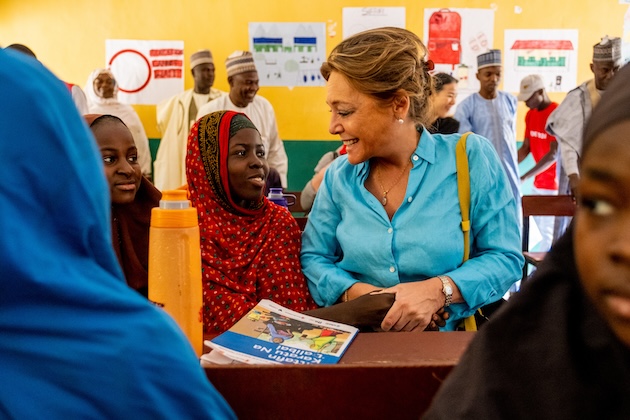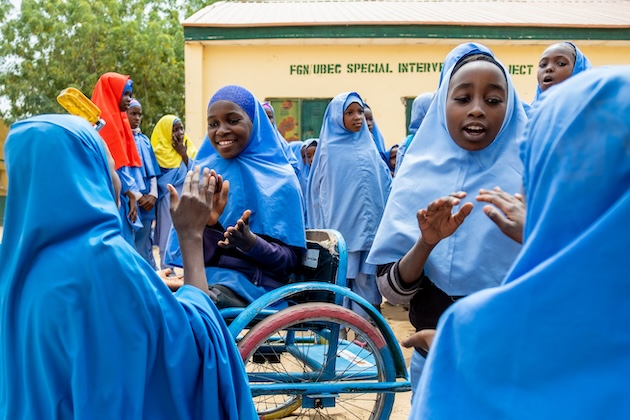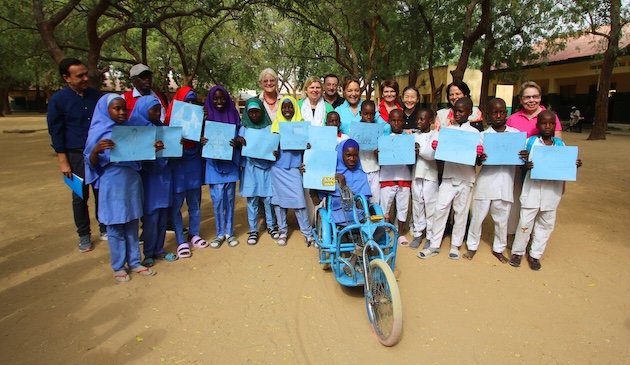ECW-supported Pompomary Major Faculty in Maiduguri, North-East Nigeria.
Credit score: ECW
MAIDUGURI, Nigeria & NAIROBI, Feb 23 (IPS) – Nigeria is house to fifteen % of the world’s out-of-school youngsters. Greater than 7.6 million ladies aren’t at school, and solely 9 % of the poorest ladies within the nation are in secondary college. The Boko Haram insurgency and different armed teams gasoline the out-of-school disaster in northeast Nigeria, disrupting the training of almost two million school-age youngsters.
Grave violations of kids’s rights prevail in northeastern areas, together with the kidnapping of hundreds of kids and younger individuals; ladies are enslaved and sexually exploited, and boys pressured to change into youngster troopers. Schooling Can not Wait (ECW) Government Director Yasmine Sherif visited communities affected by the battle and interconnected crises, witnessing first-hand the optimistic impression of ECW’s preliminary Multi-Yr Resilience Programme (2021-2024).
“We visited a major college, a transitional heart for boys that fled Boko Haram areas, and one non-formal training heart that gives vocational expertise coaching. Now we have seen the facility of holistic training to rehabilitate and reintegrate boys who’ve fled from Boko Haram areas again into society. ECW and companions, the nationwide Ministry of Schooling, the Federal State Authorities, native organizations, academics, college students, and psychologists are all working hand-in-hand, leveraging training to heal youngsters from traumatic experiences—offering them with higher life prospects,” Sherif instructed IPS.

Sherif met with senior authorities officers, together with the Minister of Schooling, Dr. Tahir Mamman, and Borno State Governor, Prof. Babagana Umara Zulum, and support companions, all working to make sure the precise to training for girls and boys. She confused that ECW’s expanded funding for crisis-affected ladies and boys in north-east Nigeria is “an funding in a extra steady, affluent, and peaceable future for the entire area. ECW’s plans to proceed offering protected, high quality holistic training and studying alternatives in direction of defending youngsters and youth from exploitation—empowering them to attain their desires of touching humanity.”
Sherif was additionally accompanied by a high-level delegation from UNICEF and the governments of Germany and Norway. Germany is ECW’s main donor with USD 366 million in whole contributions, and Norway is the Fund’s fifth largest donor with whole contributions of USD 131 million. Constructing resilient training techniques is each important and pressing for Nigeria’s crisis-impacted youngsters.
ECW’s preliminary Multi-Yr Resilience Programme, delivered by the Norwegian Refugee Council, Save the Kids, and UNICEF, has constantly achieved its targets, and has to date reached almost 500,000 youngsters and adolescents with high quality, holistic training in areas affected by the disaster in north-east Nigeria.


“We’d like extra funding to succeed in all two million youngsters in north-east Nigeria and finish the out-of-school disaster. In the meantime, the remainder of the world can not wait—we’ve dire wants within the Center East, the refugees in Latin America , throughout the Sahel area, and within the Sub-Saharan Africa area, the place 9 in 10 youngsters can not learn easy sentences,” Sherif emphasizes.
“ECW appeals for extra strategic donor companions—governments, the non-public sector, philanthropic foundations, and high-net-worth people—to hitch our efforts in mobilizing a further US$600 million to succeed in our goal of US$1.5 billion for ECW, permitting our companions to succeed in, by 2026, a complete of 20 million ladies and boys in crises-affected areas of the world high quality training.”
Dr. Heike Kuhn, Co-Chair of the ECW Government Committee and Head of Schooling Division at Germany’s Federal Ministry for Financial Cooperation and Growth, agrees, saying that constructing “resilient training techniques for elevated entry to inclusive, high quality, and lifelong studying is essential for Nigeria, as half of its inhabitants are youngsters and youth. Educating youngsters means altering their lives and letting them take part in constructing peaceable, sustainable societies.”
Merete Lundemo, Co-Chair of the ECW Government Committee and Particular Envoy for Schooling in Disaster and Battle for Norway’s Ministry of Overseas Affairs additionally emphasised that training is a lifeline for crisis-impacted youngsters and that training initiatives deliver a lot wanted reduction and normalcy to youngsters in affected areas. Welcoming strengthened cooperation with ECW to make sure that no youngster is left behind and that that is a part of Norway’s wider engagement for kids residing in armed battle.
“This joint program and the training wants and desires of Nigeria’s crisis-impacted youngsters align with the African Union’s name on all governments to make sure that all youngsters entry high quality training, formally declaring 2024 because the ‘Yr of Schooling.’ We should all come along with urgency and dedication to make this a actuality for the poor, weak youngsters in Africa residing on the margins of abject poverty, fleeing from the traumas of violent battle and interconnected crises,” Sherif noticed.
The delegation additionally met with survivors of conflict-related sexual violence who’re co-creating a brand new progressive venture launched by the International Survivors Fund with funding help from ECW. The initiative supplies formal and non-formal training as a type of reparation for survivors of conflict-related sexual violence and their youngsters.The expanded funding for the deliberate Multi-Yr Resilience Programme shall construct on ECW’s USD 23.6 million investments within the north-east of Nigeria since 2018. The investments are delivered in partnership with the Ministry of Schooling, UN companies, and worldwide and native civil society companions.
With a give attention to constructing lasting options making use of the humanitarian-development-peace nexus, ECW investments within the north-east of Nigeria have supplied youngsters with studying supplies, supported trainer coaching and incentives, college feeding, supplied important psychological well being and psychosocial help for women and boys impacted by the battle, and labored with nationwide authorities to get youngsters again to high school via everlasting community-based programmes.
IPS UN Bureau Report
Comply with @IPSNewsUNBureau
Comply with IPS Information UN Bureau on Instagram
© Inter Press Service (2024) — All Rights ReservedUnique supply: Inter Press Service
